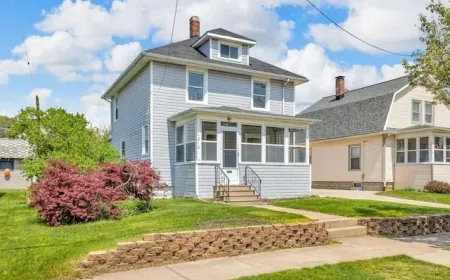Want to Save $30K Selling Your Home? These 6 Startups Help You Skip Expensive Agent Fees!
Selling your home in 2025? Skip high agent fees. These 6 startups are helping Americans save thousands with low-commission and no-agent real estate platforms.

For decades, selling a home meant paying a 5% to 6% commission split between two agents—often without much room to negotiate. But that’s changing fast. After a $418 million settlement involving the National Association of Realtors (NAR), sellers in the U.S. no longer have to offer a commission to a buyer’s agent up front.
This legal change has opened the door for tech platforms to rethink how homes are listed, sold, and marketed. These aren’t gimmicks—they’re alternatives built for sellers who want more flexibility and fewer middlemen. And while the traditional agent model still dominates, these startups are laying the groundwork for a more modern way to sell a home—with real savings.
Below are six startups helping sellers cut commission costs, connect directly with buyers, or rethink the whole home-selling process altogether.
1. Galleon: For Sellers Ready to Take the Lead
Core Idea: Self-service home listings, with optional upgrades
Cost: Free to list; add-ons start at $299
Galleon is a minimal, no-frills platform for sellers who want to control the sales process without an agent. Listings go live directly to buyers and agents. Sellers can opt for paid upgrades like professional photography, custom signs, and legal templates.
Unlike traditional platforms, Galleon doesn't take a cut of the sale. It’s aimed at informed homeowners who feel comfortable managing negotiations and paperwork.
Use case: A homeowner in a hot market listing a well-maintained property with confidence in their pricing and negotiation skills.
2. Listwise: Reverse Bidding for Real Estate Agents
Core Idea: Let agents bid to earn your listing
Cost: Free for sellers
Listwise changes how agents and sellers connect. Instead of sellers hiring the first agent they meet, the platform asks agents to submit proposals that include services offered, recent performance, and their commission rate.
This model introduces pricing pressure in an industry where fees have long been opaque. Early user data shows agents reducing commission rates by 1%–1.5% to win listings, potentially saving sellers $5,000–$10,000 per transaction.
Use case: Sellers who still want an agent but want competitive offers, better terms, and full transparency.
3. Off-Markt: The Soft Launch for Your Home
Core Idea: Create a pre-market listing to gauge buyer interest
Cost: Free
Off-Markt blends social media-style home profiles with soft market testing. Homeowners can post their property without formally listing it for sale. Think of it as a low-pressure way to collect interest, feedback, and even early offers—especially useful if you’re considering a move but aren’t ready to commit.
There’s no MLS listing, and buyers reach out directly. Some sellers use Off-Markt to connect with local buyers, then complete the sale through an attorney—bypassing both agents and commissions.
Use case: Homeowners exploring their sale options without going public too early.
4. Redy: Agents Pay Sellers for the Opportunity to Represent Them
Core Idea: Agents offer cash incentives to win listings
Cost: Free for sellers
Redy flips the traditional relationship: sellers receive competitive bids from agents, who may offer cash upfront or reduced fees to win the listing. It’s a demand-driven approach where agents actively compete for listings by putting skin in the game.
The average seller sees offers ranging from $1,000–$3,000 in incentives or rebates, along with reduced commissions. Some agents use Redy as a way to secure business in competitive markets where traditional referrals are drying up.
Use case: Sellers open to agent partnerships—but only on favorable, transparent terms.
5. Ridley: Tools and Legal Support for FSBO Sellers
Core Idea: Do-it-yourself home sales with structured guidance
Cost: $999–$1,999
Ridley targets FSBO (For Sale By Owner) sellers who want to manage their own sales but avoid legal risks and time-wasting errors. The platform provides an AI-driven listing assistant, contract templates, digital checklists, and legal support. A more expensive tier includes on-call help from real estate attorneys.
Founder Mike Chambers gained popularity on TikTok by showing how he sold his home commission-free—and Ridley builds on that playbook with structured tools for first-time FSBO sellers.
Use case: Sellers looking to bypass agents while still protecting themselves legally and financially.
6. Turbohome: A Flat-Fee Model That Refunds Buyer Commissions
Core Idea: Buyers pay a fixed fee, not a percentage
Cost: $5,000–$10,000 flat fee (paid by buyers)
Turbohome eliminates commission percentages altogether. Its agents are salaried employees, and buyers pay a one-time service fee. If the seller still offers a commission, that amount is refunded back to the buyer—effectively lowering their closing costs.
The model works well in high-value markets where 3% commissions can exceed $20,000–$40,000. Turbohome operates in California, Texas, and Washington and is expanding as commission transparency grows more important post-NAR settlement.
Use case: Buyers and sellers prioritizing fee clarity and cash savings, especially on homes above $750,000.
The average U.S. home sale still involves around $20,000–$30,000 in agent commissions. But starting July 2025, new legal rules will make it easier to negotiate—or skip—these fees altogether.
Each of these six startups represents a different path:
-
Full control and self-listing (Galleon, Ridley)
-
Smarter agent partnerships (Listwise, Redy)
-
Alternative buyer access (Off-Markt, Turbohome)
Sellers no longer have to accept a one-size-fits-all process. In a post-NAR world, real estate is becoming a marketplace of options—where cost, control, and convenience are finally in the hands of homeowners.
Also Read: 30-Year Mortgage Rates Dip to 6.76%—Easing Pressure on Buyers































































